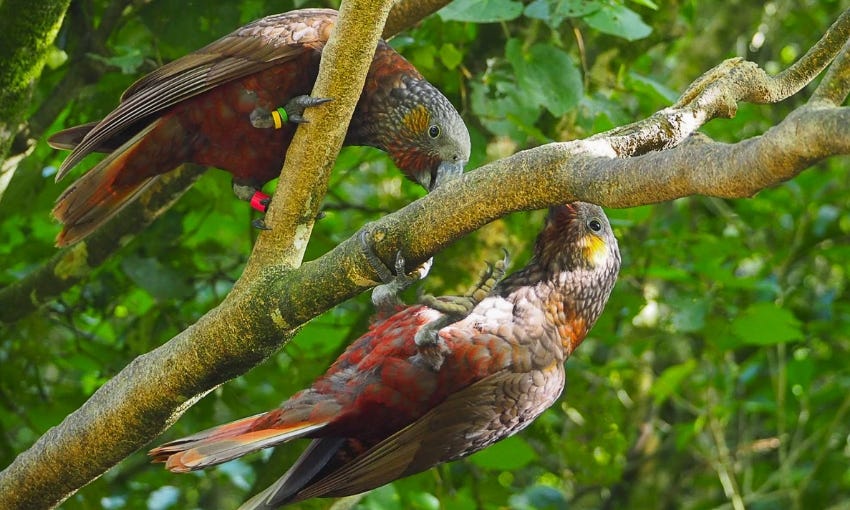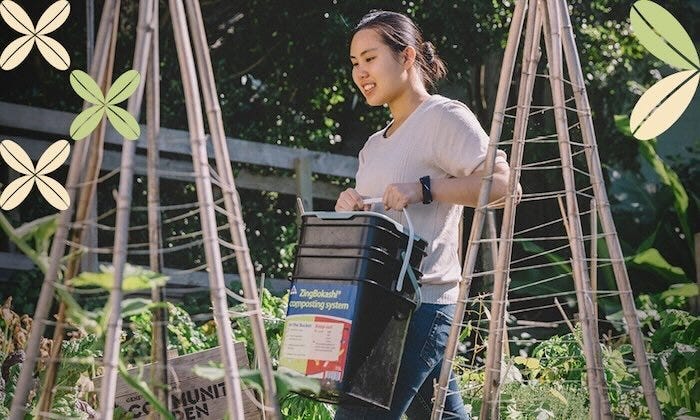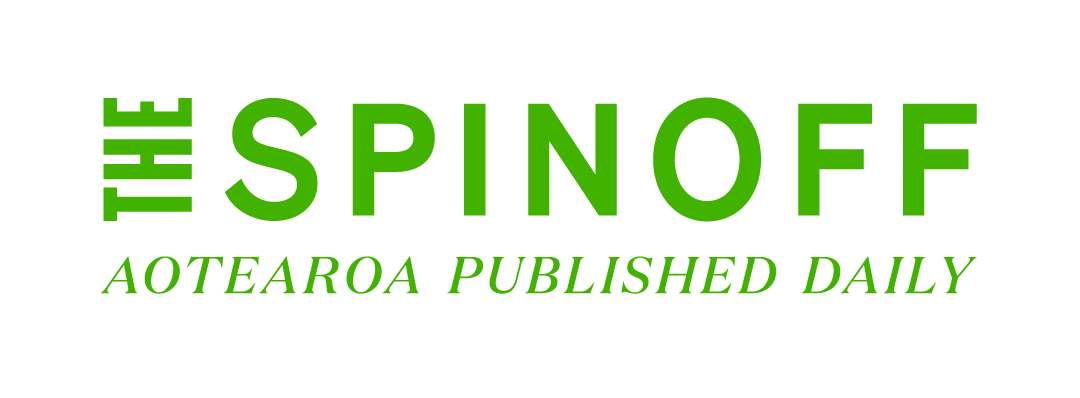How is New Zealand tracking on the quest to be predator free?
“The mood is incredibly positive – and increasingly so.”
Kia ora, welcome to Future Proof. I’m Ellen, thanks for joining me this week.
On Waiheke Island, residents are woken up by heightened birdsong and screeching kākā. On the Miramar Peninsula, the Wellington green gecko has been seen for the first time in years – if not generations. And in the hills behind the capital city, reintroduced kiwi are starting to breed.
It’s been almost eight years since former prime minister John Key announced the “moonshot” goal for Aotearoa to be free of rats, possums and mustelids by 2050. Now, in some places, the biodiversity is beginning to bounce back.
“We’re starting to see gains from a community, social perspective, and biodiversity, and also from an economic perspective,” says Brett Butland, landscape director at Predator Free 2050 Ltd. “People are seeing the benefits, the feedback from communities, landowners, mana whenua and councils, they’re seeing economic impact in their region.”
Predator Free 2050 Ltd is the charitable company created by the Crown to deliver on the predator free aspiration, funding 18 landscape-scale projects from the Bay of Islands to Dunedin to the Chatham Islands.
Collectively, they’ve cleared possums, rats and mustelids (stoats, ferrets and weasels) from 107,000 hectares – an area about two-thirds the size of Rakiura Stewart Island. “The biodiversity gains are huge,” says Butland. Waiheke has seen native and endemic bird counts increase by 52% between 2020 and 2023, and Miramar Peninsula has seen a 71% increase in native bird detections over five years. The projects are also providing meaningful jobs, opportunities for kaitiakitanga, and community unity.
‘We’ve found the pathway, now we need to find the highway’
At a recent hui, the 18 big projects and other players in the Predator Free 2050 movement gathered to discuss these wins – and the big challenges looming. “We’ve gone from the question of ‘can we do this at all?’ to now saying, we can do more than 100,000 hectares and defend that with competence,” says Butland.
But if we’re going to reach that 2050 target, from 2030 we’ll need to be churning through up to 1.5 million hectares every year, Butland explains, to achieve eradication across the entire 26 million-odd hectares. That will come with a chunky price tag, and poses gnarly technical and social challenges. (This article from The Post has a good overview of some of those difficulties.)
“There’s still a lot we don’t know,” says Butland, “and no silver bullet. But people are working together to find a solution rather than saying it’s just too hard. The tight timeline is “forcing innovation,” Butland says, with 26 new tools on the market. “If there's a will, there's a way, and I think we’ve started to show that there's probably a way.”
“We’re now starting to enable the next generation of children being born who won’t know what a rat in the roof sounds like,” says Butland. Instead, they’ll hear the raucous, lovely kākā.
Turn waste into gold for your garden
Composting is easy once you know how, and you can learn all the ins and outs at Compost Collective's free workshops, and even become a ShareWaste NZ composter for your community.
Make the most of your waste with free composting workshops and advice at compostcollective.org.nz. (Sponsored)
Māori and Pacific leaders call for whales to have legal personhood
Indigenous leaders from across the Pacific, including the Māori King, signed a declaration seeking legal personhood for tohorā whales in the Cook Islands last week. He Whakaputanga Moana, the Ocean Declaration, draws on te ao Māori concepts such as rāhui to protect whales that travel across national boundaries. Inspired by the Te Urewera Act that granted legal personhood to the Te Urewera forest, the declaration “goes beyond traditional conservation measures by recognising whales as legal persons with inherent rights,” writes Mere Takoko, one of the conservationists spearheading the call to action.
Flexitarian diet on the menu for climate action
Shifting to a mostly plant-based diet would lower greenhouse gas emissions from food and make the 1.5°C climate goal more feasible, a new study finds. The EAT-Lancet Planetary Health Diet doesn’t cut out meat completely, but does reduce meat consumption to much lower levels than the classic Kiwi diet: about 100g of red meat and 200g each of poultry and fish is on the menu each week. In Germany, a group of hospitals serving 13,000 meals every day has switched to the plant-rich planetary health diet – with few complaints.
How to go electric
New Zealand is one of the first countries to reach the “electrification tipping point”, where it’s cheaper (and better for the planet) to make the switch from fossil fuel-powered homes to fully electric. In this week’s episode of When the Facts Change, Bernard Hickey speaks to the CEO of Rewiring Aotearoa, Mike Casey, about the barriers and benefits of going electric.
Join The Spinoff members, now with comments
Spinoff members are now able to comment on certain stories. It’s another way for us to bring to life the value of belonging to the community of Spinoff supporters. I explain why we’re doing this here, and if I ever publish another big food ranking, you have my permission to give me your worst. It’s just one of the perks of being a Spinoff supporter.
Today you can also chime in on:
Duncan Greive’s take on what Auckland can learn from Austin, Texas, and SXSW
vape retailers continuing to sell high-nicotine products that were banned on 21 March.
Log in, let us know what you think, and as always, we’d be grateful if you’d consider becoming a Spinoff supporter if you’re not already.
See you in the comments sections,
Madeleine Chapman
Editor
More stories
The government has scrapped plans for the Kermadec Ocean Sanctuary, opening the door to potential seabed mining in the pristine ecosystem.
Germany plans to introduce “net negative” emissions targets for later this century – what does that mean?
Climate scientist Jim Salinger named New Zealander of the Year.
A proposed constitutional amendment in the Caribbean nation Aruba would recognise the right of nature to exist – the second country in the world, after Ecuador, to enshrine nature rights in this way.
The International Maritime Organization, which regulates global shipping, has proposed a world-first global carbon tax.
“Cinematic poem” on climate justice and activism by Fijian filmmaker, which premiered at the Māoriland film festival, aims to inspire the next generation of Pacific climate warriors.
From carbon offsets to the identity of New Zealand’s biggest emissions polluters: the 1News Climate Check series breaks down the big climate questions.
To finish this edition, an interesting long-watch on how the eco-credentials of electric bikes stack up. After spending most of my cycle-commute life in relatively flat cities, I invested in an e-bike when I moved to Auckland to flatten out the hills on my ride into the city (or to the beach). So I can confirm: climate benefits aside, riding an e-bike is super fun.
Have a wheelie spoke-tacular week,
Ellen
Future Proof is looking for a sponsor!
Connect your brand with an insightful exploration of environmental news, reaching influential readers committed to sustainability and staying informed about the state of our natural world. Contact commercial@thespinoff.co.nz to learn more.
Got some feedback about Future Proof or topics you’d like covered? Get in touch with me at futureproof@thespinoff.co.nz












Ellen you never fail to bring a smile to my face. Always heaps of interesting info too. Thanks!